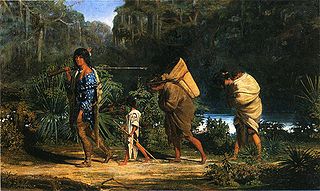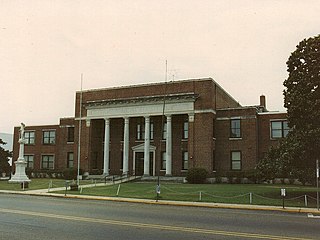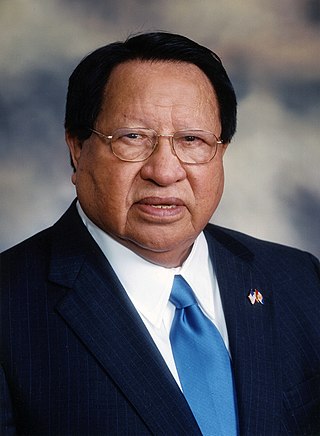Related Research Articles

The Choctaw are a Native American people originally based in the Southeastern Woodlands, in what is now Alabama and Mississippi. Their Choctaw language is a Western Muskogean language. Today, Choctaw people are enrolled in three federally recognized tribes: the Choctaw Nation of Oklahoma, Mississippi Band of Choctaw Indians, and Jena Band of Choctaw Indians in Louisiana.

Neshoba County is located in the central part of the U.S. state of Mississippi. As of the 2020 census, the population was 29,087. Its county seat is Philadelphia. It was named after Nashoba, a Choctaw chief. His name means "wolf" in the Choctaw language.

Conehatta is a census-designated place (CDP) in Newton County, Mississippi. The population was 997 at the 2000 census. It is one of the eight communities included in the Mississippi Band of Choctaw Indians Reservation and the population is 76% Choctaw.

The Pine Ridge Indian Reservation, also called Pine Ridge Agency, is an Oglala Lakota Indian reservation located almost entirely within the U.S. state of South Dakota, with a small portion in Nebraska. Originally included within the territory of the Great Sioux Reservation, Pine Ridge was created by the Act of March 2, 1889, 25 Stat. 888. in the southwest corner of South Dakota on the Nebraska border. Today it consists of 3,468.85 sq mi (8,984 km2) of land area and is one of the largest reservations in the United States.

Phillip Martin was a Native American political leader, the democratically elected Tribal Chief of the Mississippi Band of Choctaw Indians. This federally recognized American Indian tribe has 8,300 enrolled members living on or near 30,000 acres (120 km2) of reservation land in east central Mississippi. Martin had a 40-year record of service to the Tribal government, including 32 years as the Tribe's principal elected official. Chief Martin left office in 2007 after the election of Miko Beasley Denson.
State-recognized tribes in the United States are organizations that identify as Native American tribes or heritage groups that do not meet the criteria for federally recognized Indian tribes but have been recognized by a process established under assorted state government laws for varying purposes or by governor's executive orders. State recognition does not dictate whether or not they are recognized as Native American tribes by continually existing tribal nations.

The Choctaw Nation is a Native American territory covering about 6,952,960 acres, occupying portions of southeastern Oklahoma in the United States. The Choctaw Nation is the third-largest federally recognized tribe in the United States and the second-largest Indian reservation in area after the Navajo. As of 2011, the tribe has 223,279 enrolled members, of whom 84,670 live within the state of Oklahoma and 41,616 live within the Choctaw Nation's jurisdiction. A total of 233,126 people live within these boundaries, with its tribal jurisdictional area comprising 10.5 counties in the state, with the seat of government being located in Durant, Oklahoma. It shares borders with the reservations of the Chickasaw, Muscogee, and Cherokee, as well as the U.S. states of Texas and Arkansas. By area, the Choctaw Nation is larger than eight U.S. states.

The Rosebud Indian Reservation is an Indian reservation in South Dakota, United States. It is the home of the federally recognized Rosebud Sioux Tribe, who are Sicangu, a band of Lakota people. The Lakota name Sicangu Oyate translates as the "Burnt Thigh Nation", also known by the French term, the Brulé Sioux.
The Mississippi Band of Choctaw Indians is one of three federally recognized tribes of Choctaw people, and the only one in the state of Mississippi. On April 20, 1945, this tribe organized under the Indian Reorganization Act of 1934. Their reservation included lands in Neshoba, Leake, Newton, Scott, Jones, Attala, Kemper, and Winston counties. The Mississippi Choctaw regained stewardship of their mother mound, Nanih Waiya mounds and cave in 2008. The Mississippi Band of Choctaw have declared August 18 as a tribal holiday to celebrate their regaining control of the sacred site. The other two Choctaw groups are the Choctaw Nation of Oklahoma, the third largest tribe in the United States, and the Jena Band of Choctaw Indians, located in Louisiana.
The Choctaw Tribal School System is a school system based in the community of Choctaw, Mississippi (US). An entity operated by the federally recognized Mississippi Band of Choctaw Indians, the district consists of eight schools in three counties: Neshoba, Leake, and Newton. It has a total enrollment of 1,700 to 1,800 students. It is the largest unified and locally controlled Indian school system in the United States. It is affiliated with the Bureau of Indian Education (BIE). The current Director of Schools is Mr. Terry Ben.

Allen Wright was Principal Chief of the Choctaw Republic from late 1866 to 1870. He had been ordained as a Presbyterian minister in 1852 after graduating from Union Theological Seminary in New York City. He was very active in the Choctaw government, holding several elected positions. He has been credited with the name Oklahoma for the land that would become the state.
Pearl River Resort is a gaming resort located in Choctaw, Neshoba County, Mississippi. It is owned and operated by the federally recognized Mississippi Band of Choctaw Indians. The resort includes two casinos, Silver Star Hotel & Casino and Golden Moon Hotel & Casino; a Dancing Rabbit Inn near the casinos; Dancing Rabbit Golf Club, an award-winning golf course designed by Jerry Pate; Geyser Falls Water Theme Park; and a spa.
The Paiute-Shoshone Indians of the Lone Pine Community of the Lone Pine Reservation is a federally recognized tribe of Mono and Timbisha Native American Indians near Lone Pine in Inyo County, California. They are related to the Owens Valley Paiute.
Phyliss J. Anderson is the first female elected Chief of the Mississippi Band of Choctaw Indians. She succeeded the incumbent Miko, Beasley Denson after the election committee concluded ballot count on July 6, 2011. Anderson polled 1,971 votes to defeat Beasley Denson who polled 1,618.
United States v. John, 437 U.S. 634 (1978), was a case in which the Supreme Court of the United States held that lands designated as a reservation in Mississippi are "Indian country" as defined by statute, although the reservation was established nearly a century after Indian removal and related treaties. The court ruled that, under the Major Crimes Act, the State has no jurisdiction to try a Native American for crimes covered by that act that occurred on reservation land.

Harry James Watson "Jimmy" Belvin was an educator and served as an Oklahoma State Representative and Senator. He was the first elected principal chief of any of the Five Civilized Tribes in the 20th century, and the longest serving principal chief of the Choctaw Nation of Oklahoma. He saw his tribe through termination, restoration, and a rebirth of Native Pride. He was a polarizing leader, seen by some as a semi-dictator who held onto the office of principal chief and used his power to advocate for complete assimilation into the dominant society, suppressing Choctaw traditions, language and ceremonial practices as undesirable remnants of an unrefined history. To others, he was a well-liked, populist leader, who went door-to-door talking with tribe members, informing them on issues, and trying to develop the means the alleviate the poverty and unemployment they faced.
The History of the Choctaws, or Chahtas, are a Native American people originally from the Southeast of what is currently known as the United States. They are known for their rapid post-colonial adoption of a written language, transitioning to yeoman farming methods, and having European-American and African-Americans lifestyles enforced in their society.
References
- ↑ "Beasley Denson: Sworn in as Chief of Mississippi Band, Denson assumes title of Miko". Tanasi Journal. 2007-08-14. Archived from the original on 2007-09-30. Retrieved 2009-07-21.
- ↑ "Recount Done, Martin Concedes Defeat". WTOK-TV. 2007-07-05. Archived from the original on 2008-11-12. Retrieved 2009-12-01.
- ↑ "Miko Beasley Denson takes over Choctaws". The Meridian Star . 2007-07-10. Archived from the original on 2013-01-28. Retrieved 2009-12-01.
- ↑ "Welcome from Miko Beasley Denson". Archived from the original on 2010-03-15. Retrieved 2009-12-01.